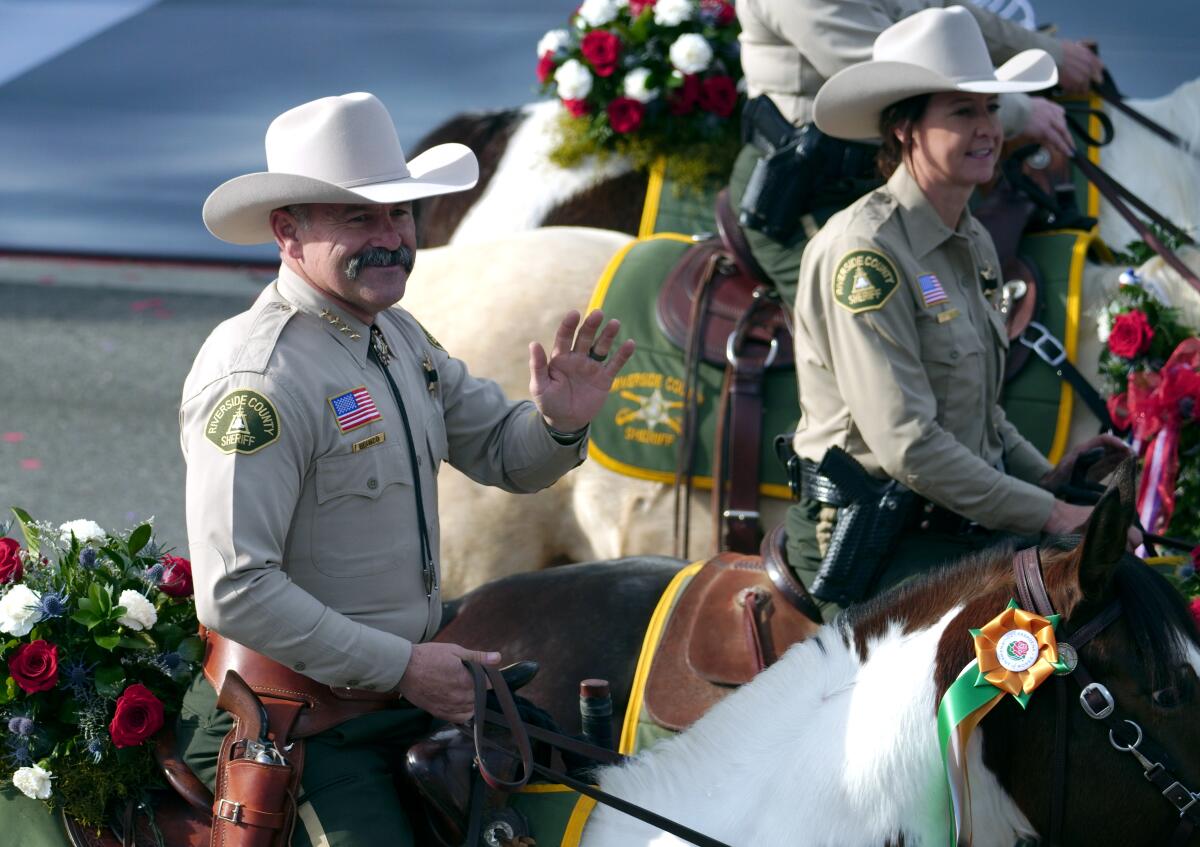Column: California’s race for governor is getting interesting

- Share via
You're reading the L.A. Times Politics newsletter
Anita Chabria and David Lauter bring insights into legislation, politics and policy from California and beyond. In your inbox three times per week.
You may occasionally receive promotional content from the Los Angeles Times.
SACRAMENTO — As Californians wait to hear whether two more powerful Democrats will jump into the 2026 governor’s race — former Vice President and presidential nominee Kamala Harris and former Rep. Katie Porter — the first major Republican decided to take the plunge.
Riverside County Sheriff Chad Bianco, a loyalist to President Trump and antagonist to Democratic Gov. Gavin Newsom, on Monday plans to make his campaign official at a shindig in downtown Riverside. News leaked out last week because, you know, that’s how things roll in politics.
California voters haven’t elected a Republican governor since Arnold Schwarzenegger won a second term in 2006. In fact, no Republican has won a statewide race since 2006. Democratic voters also outnumber Republicans by nearly a 2-to-1 margin.
So Bianco’s chances are slim to none, right? Perhaps. But, as rock ‘n’ roll legend Chuck Berry so eloquently told us: You never can tell. (Bruce Springsteen did a cool impromptu version of that song too.)
This is Phil Willon, the assistant editor in the Times’ Sacramento bureau, standing in for columnist George Skelton this week. I covered the last two races for governor in California and, while I try to avoid make predictions, I have a feeling the 2026 race is about to get real interesting, real soon.
New sheriff in town
Thus far, no other big-name Republicans are in the race so Bianco could have a legit shot at squeaking through the 2026 primary and making it to the November election. Democrats already have a large field of top-tier candidates, even without Harris or Porter, and would likely fracture the Democratic vote — opening a lane for a Republican who can consolidate conservative support.
Speculation abounds about other possible GOP candidates who may join Bianco, so the next few months may prove interesting. Among them are conservative commentator Steve Hilton and Richard “Ric” Grenell, who served as ambassador to Germany during Trump’s first term.
Republicans have been better than the Democrats at signing up new voters over the past two years. Plus, Trump fared better in California in November than he did in the 2020 or 2016 presidential races. He still lost to Harris by more than 3 million votes, though, so don’t get carried away.
The biggest advantage for Bianco may be that badge pinned to his chest.
California voters in November sent a strong rebuke to the Democratic-led criminal justice reforms championed over the past decade. They overwhelmingly passed Proposition 36, a ballot measure cracking down on theft crimes and the use of the deadly drug fentanyl. Even in liberal Los Angeles County, voters ousted progressive Dist. Atty. George Gascon, who was elected on a platform of reform and restorative justice.
Support for Proposition 36 came amid rising concerns about crime, homelessness and drug use in the state, an issue seized upon by Republicans and law enforcement leaders. Among them: Bianco. Newsom and other top Democrats opposed the measure.
“For the past 30 years, I’ve been doing everything I could to keep our community safe by arresting criminals and putting them in jail and putting them in prison, keeping them out of our neighborhoods. For the last five years, I’ve been very critical about our governor for slashing our budgets from corrections, for letting prisoners out early, for closing our prisons.”
That’s just a snippet of what Bianco said in an Instagram post last year when he announced his endorsement of Trump for president. Expect to hear a lot more along those lines from him. Also, expect Democratic candidates to use his ties to Trump — who remains very unpopular overall in California — against him.
That and Bianco’s ties to the Oath Keepers, a far-right, anti-government group whose members took part in the pro-Trump insurrection at the U.S. Capitol on Jan. 6, 2021. A data leak revealed that in 2014 he was a member of the organization. Bianco later said he had discontinued his membership because, like many other law enforcement officers, he felt the organization “did not offer me anything.”
Change in San Francisco
Times reporter Hannah Wiley had an interesting dispatch from the Bay Area. San Francisco Mayor Daniel Lurie notched an early victory in his crusade against the city’s twin crises of homelessness and fentanyl addiction, getting sign-off from the Board of Supervisors to bypass bureaucratic hurdles that have slowed expansion of shelter capacity and treatment programs, and more leeway to pursue private funding to help finance those initiatives.
The measure, the Fentanyl State of Emergency Ordinance, marks Lurie’s first big step in fulfilling a campaign promise to visibly reduce homeless encampments and open-air drug use within six months of taking office, in part by adding 1,500 shelter beds and expanding behavioral and mental health services.
That pledge helped Lurie, a moderate Democrat and political newcomer, triumph in the November election against incumbent London Breed and three other City Hall veterans whom he accused of allowing homelessness, addiction and the companion ills of retail and property crimes to fester.
What else you should be reading
The must-read: California, other states sue over Elon Musk’s virtually ‘unchecked’ power in White House.
The TK: Gavin Newsom, Donald Trump and the art of the deal
The L.A. Times Special: California lawmakers propose banning sales from dog brokers in crackdown on puppy pipeline
—
Was this newsletter forwarded to you? Sign up here to get it in your inbox.
Get the L.A. Times Politics newsletter
Deeply reported insights into legislation, politics and policy from Sacramento, Washington and beyond. In your inbox twice per week.
You may occasionally receive promotional content from the Los Angeles Times.




